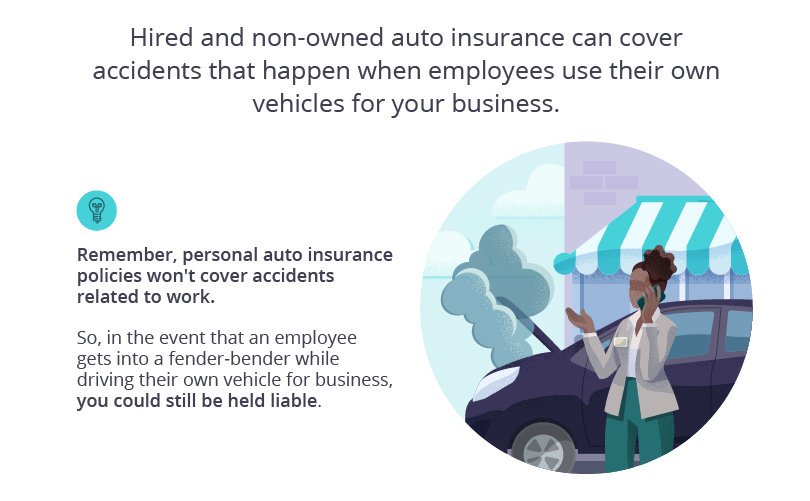
Commercial auto vs. hired and non-owned auto insurance
Commercial auto insurance provides protections for vehicles owned by a business. If you use personal or rented vehicles for work, you might need hired and non-owned auto insurance.
When does a small business need commercial auto insurance?
Commercial auto insurance covers automobiles, trucks, vans, and other vehicles that your business owns. Policies can cover:
- Auto liability if you damage another party's automobile
- Medical expenses for injuries sustained in a crash
- Physical damage caused by wrecks, theft, vandalism, and storms
- Uninsured motorists who cause accidents and don’t have coverage
If you drive a company vehicle to meet clients or transport equipment, raw materials, or products, you'll need commercial auto insurance coverage.
Nearly every state requires commercial auto insurance coverage for business-owned vehicles.
Find commercial auto insurance requirements in your state

When does a small business need hired and non-owned auto insurance?
Hired and non-owned auto insurance (HNOA insurance) covers liability expenses for accidents involving vehicles that your business uses for work purposes but doesn’t own. This includes vehicles that your business rents, as well as your employees’ personal vehicles that are used for work errands.
For example, if your employee drives their car to drop off a business deposit at the bank and causes an accident, the other driver can sue your business for expenses related to the crash (e.g., medical treatment and vehicle repair damages). HNOA insurance can cover these costs.
Many companies rent trucks for deliveries or transporting passengers. If an accident should occur in one of these rented vehicles, HNOA insurance can cover those liability expenses, too.
Note: HNOA insurance doesn’t cover accidents that occur during commutes or personal errands during business hours. It also can’t pay for physical damages to the non-owned vehicle.
You can purchase HNOA insurance as a standalone policy or add it as a rider to your general liability insurance or commercial auto insurance policy.
If your business owns vehicles, but also rents vehicles or uses employee cars for business purposes – say during peak seasons or special events – you might need both types of auto insurance.

Can a small business get by with just personal auto insurance?
If you use your personal vehicle for work, your personal auto insurance policy may not cover you. These policies generally exclude business driving from their coverage, so you would be personally responsible for expenses if you get into an accident while delivering or hauling goods. Check to see what your coverage entails because every personal policy is different.

Get business auto insurance quotes with Insureon
Fill out an online application with Insureon to receive free quotes for commercial auto or hired and non-owned auto insurance. You can also contact an agent to discuss which type of policy best suits your business. The cost of a fender bender or a collision is often high, but you can protect your business's finances by purchasing the right auto insurance coverage.
Verified business insurance reviews
Hear from customers like you who purchased small business insurance.

Want free expert advice right in your inbox?
By entering your email address and subscribing, you agree to our Terms of Use and Privacy Policy
